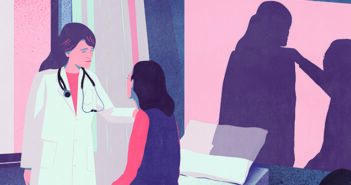Brown professor’s study receives top research prize from American Heart Association.
A study co-authored by a Warren Alpert Medical School physician, focused on women with a history of stroke and their belief that they won’t get adequate care, received top honors from the American Heart Association as part of its Research Goes Red Data Challenge.
Tracy Madsen RES’12 F’14 ScM’14 PhD’21, MD, associate professor of emergency medicine, joined the study’s co-authors in Philadelphia on Nov. 11 to accept the grand prize and present their findings at the AHA Scientific Sessions 2023. The results of the study were published in Stroke.

Tracy Madsen
Madsen says she was “thrilled” to hear the study had attracted such positive attention, especially given the opportunity to take on this research came through a chance encounter. She met her two co-authors at the International Stroke Conference, and the group discovered overlapping interests regarding disparities in stroke care. Even as part of a relatively new collaboration, she was happy to work with investigators who were so interested in finding ways to ensure equitable stroke care for all patients.
“To find out that the study was so well regarded by the scientific community was really exciting,” she says.
The AHA challenge encourages researchers to collaborate on issues related to women’s cardiovascular health, and provides them with a range of health survey data and resources to develop new studies.
Madsen has been studying emergency stroke care among women for about 10 years, usually examining objective data, like measuring how long it takes a woman to receive care like a CT scan or medications for a stroke. Her past research has identified areas of improvement with regard to disparities and inequities in the timeliness of treatment of women stroke survivors.
For the new study, Madsen’s team examined survey data from the AHA Research Goes Red Registry and found women with a history of stroke were more likely to believe they would not receive adequate care in an emergency room due to their gender or race. Capturing patients’ perception of their care made this particular study unique, she says.
“There is not a lot presently in the literature about how women who have had strokes feel about the care that they’ve received or will receive,” Madsen says.
For Madsen and her colleagues, the findings are concerning. Negative predispositions toward emergency care can delay treatment, and the research also lines up with previous studies that showed women who experienced strokes were more likely to face delays in care or not receive standard of care treatments.
“We want anyone coming to the emergency department—across all traits like gender, race, ethnicity, and so on—to feel confident that they’re receiving excellent care,” she says. “For the scientific community, I think it’s important to take some next steps and dig a little bit deeper and understand why women feel this way. There is objective data that support these perceptions, but what are the next steps in terms of research to figure out how we can eliminate disparities and inequities in treatment in emergency departments?”
Madsen believes the positive attention the study has received signals shifting attitudes in stroke care for women.
“When I first started doing some of this work 10 years ago, it felt like there weren’t that many people working in this area, but the number of investigators that are actively working on ways to improve stroke care for women has really expanded over the past several years,” she says. “It’s exciting that people are interested in this topic and working hard to identify strategies to improve stroke care for women. Understanding how to improve stroke care for women will not elevate stroke care for women but will ultimately improve stroke care for all.”




